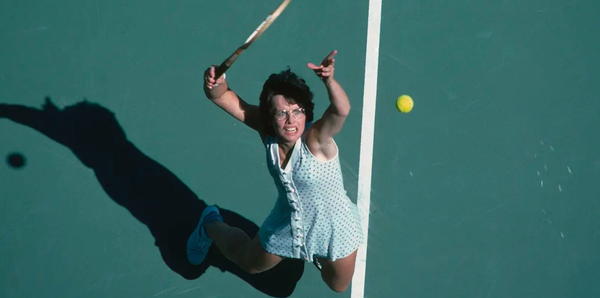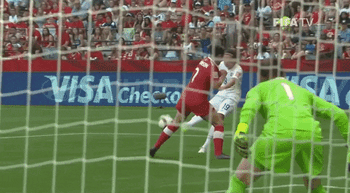Celebrating Athlete Activism

🎾 Billie Jean King: Equal pay for equal play
In 1972, tennis’ brightest star, Billie Jean King (BJK), was flying high. King closed the year by winning her second-straight U.S. Open, taking home $10K for first place — $15K less than the men’s singles top prize.
- That didn’t sit well with BJK, who told the tournament director she would not return to defend her title (again) if there wasn’t equal prize money.
Just before Wimbledon in June 1973, King mobilized, gathering 63 of her fellow female tennis pros to create the Women’s Tennis Association (WTA), uniting the group under one tour for the very first time and bolstering their power as a collective voice.
- Led by BJK, threats to boycott the U.S. Open in September grew louder and louder — and that’s when Ban deodorant stepped in, donating enough money to the women’s purse to equal it to the men’s.
It took another 34 years, but by 2007, the other three tennis Grand Slams followed suit. What’s more, BJK’s fight for gender equality extends far beyond the tennis court. The legendary activist has supported countless other athletes and teams in their fights against discrimination, including the USWNT.
- Following King’s example, the USWNT realized their best bargaining chip was their talent, so they threatened to boycott playing numerous times from the late nineties until 2022, when the team finally achieved equal pay. That’s right.
🏀 WNBA: Refusing silence in the fight against racism

Following the 2020 murder of George Floyd, there was a global reckoning on racism, with Black Lives Matter (BLM) protests popping up around the world during a notoriously contentious and important American election year.
- But months before Floyd’s death, Breonna Taylor, a 26-year-old Black woman, was killed by police inside her own home. When the WNBA returned to the court in July 2020, they dedicated their season to Taylor, lifting up the #SayHerName movement.
- Shortly after, Kelly Loeffler, then a Republican Senator for Georgia and co-owner of the Atlanta Dream, revealed her disdain for BLM and advocated for “less—not more politics in sports,” leading the WNBA Players Association to call for her ouster from the league.
The WNBA couldn’t force Loeffler to sell, so the players took matters into their own hands, focusing their attention on disrupting Loeffler's Senate campaign instead. The Dream donned VOTE WARNOCK shirts in support of her Democratic opponent, Raphael Warnock, who eventually won the hotly-contested election.
- After she lost her seat of power in the American government, Loeffler sold her stake in the Dream. See you never.
👊 Trans rights are human rights

Trans athletes’ participation in sports is under attack, from the youth level to the pros. In the U.S., hundreds of anti-LGBTQIA+ bills have been enacted, including many that target trans kids by preventing them from playing on teams that align with their gender identity. Devastating.
- Adding insult to atrocity, many of these bills weaponize women’s sports to “protect” young female athletes. The audacity.
- Thankfully, high-profile professional athletes like the aforementioned BJK, USWNT legend Megan Rapinoe, and former NBA superstar Dwyane Wade are speaking out in support of the trans community and their pursuits on and off the field.
Ahead of the 2023 FIFA Women’s World Cup, Rapinoe made it clear her fight for trans youth participation will continue after her retirement, calling out people like former ESPN anchor Sage Steele and comedian Dave Chappelle, whose transphobic comments, Pinoe believes, “directly leads to violence” towards trans people.
👀 Zooming out

The TL;DR? In spite of calls for pro athletes to “shut up and dribble,” sports and the fight for human rights are intrinsically linked.
- Take the 2022 FIFA World Cup in Qatar, just one year ago. At least 6.5K migrant workers died building infrastructure for the tournament, which was awarded to a country that has committed numerous human rights atrocities. Make it make sense.
- Qatar hosting was a blatant example of sportswashing, something numerous athletes and teams expressed discomfort with ahead of and during the event, casting a serious (and warranted) shadow on soccer’s biggest celebration.
As they have for decades, athletes will continue using their platforms to address these inequities. Fight on.
Enjoying this article? Want more?

Sign up for The GIST and receive the latest sports news straight to your inbox three times a week.

